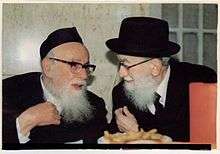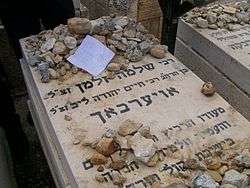Shlomo Zalman Auerbach
| Rabbi Shlomo Zalman Auerbach | |
|---|---|
 Shlomo Zalman Auerbach with Gedaliah Eiseman (1989) | |
| Position | Rosh Yeshiva |
| Yeshiva | Kol Torah |
| Personal details | |
| Born |
July 20, 1910 Shaarei Chesed, Ottoman Empire |
| Died |
February 20, 1995 (aged 84) Israel |
| Denomination | Orthodox |
| Spouse | Chaya Rivka Ruchamkin[1] |
| Children |
Shmuel Ezriel Avraham Dov Mordechai Yaakov Auerbach Meir Simcha Baruch |
Shlomo Zalman Auerbach (Hebrew: שלמה זלמן אוירבך; July 20, 1910 - February 20, 1995) was a renowned Orthodox Jewish rabbi, posek, and rosh yeshiva of the Kol Torah yeshiva in Jerusalem, Israel. The Jerusalem neighborhood Ramat Shlomo is named after Rabbi Auerbach.[2]
Biography
Auerbach was the first child to be born in the Shaarei Chesed neighborhood of Jerusalem founded by his maternal grandfather, Rabbi Shlomo Zalman Porush, after whom he was named.[1] His father, Rabbi Chaim Yehuda Leib Auerbach, was rosh yeshiva of Shaar Hashamayim Yeshiva, and his mother was Rebbetzin Tzivia.
By the age of eleven he was proficient in the entire talmudic tractate of Kiddushin. As a teenager he attended the Etz Chaim Yeshiva in Jerusalem. He was known for his diligence which is illustrated by an event which occurred while he was in yeshiva. On the day the first automobile rolled into Jerusalem along the Jaffa Road, all the students left their studies to marvel at the horse-less wagon. Only young Shlomo Zalman remained in his chair immersed in his studies.[3] Following his marriage he studied under Rabbi Zvi Pesach Frank at Kollel Kerem Tzion which focused on the laws of the Land of Israel. He was known as one of the Charedi Ashkenazi supporters for Heter Mechira during the Shmita year.
His first major published work, Meorei Esh, was the first ever written on the subject of using electricity on Shabbat. The work was endorsed by Rabbi Chaim Ozer Grodzinski who read it and declared: "Or chadash al Tziyon ta'ir" — "A new light will shine upon Zion" — a quote from the daily morning prayers.
He had a close association with Rabbi Chaim Ozer Grodzinski, as well as the Chazon Ish and Rabbi Elazar Menachem Shach, the two iconic and preeminent leaders of Haredi Judaism of the first and middle segments of the 20th century. He became the pre-eminent halachic decisor of his time in Israel, respected by all streams of Orthodox Judaism. He was unique in his approach to halacha through thought experiments.
Renowned for his lucid classes as Rosh Yeshiva, his thousands of students continue to influence the Torah world today. An estimated 300,000 - 500,000 people attended his funeral in 1995. He was interred on Har HaMenuchot.
He was the brother-in-law of Rabbi Sholom Schwadron, who married his sister Leah. The two shared a long and close relationship as learning partners and personal friends.
Children
Rabbi Auerbach had seven sons and three daughters. His sons are:
- Rabbi Shmuel Auerbach, a leading authority of the Degel HaTorah political party
- Rabbi Ezriel Auerbach, a son-in-law of Rabbi Yosef Shalom Elyashiv, and the Rov of Chanichei Hayeshivot in Bayit Vegan
- Rabbi Avraham Dov Auerbach, a Rabbi in Tiberias
- Rabbi Mordechai Auerbach, the pulpit Rabbi of Avir Ya'akov in Tel Aviv
- Rabbi Ya'akov Auerbach, a Rabbi in Beit Shemesh
- Rabbi Meir Simcha Auerbach, a posek and Rosh Yeshiva in Betar Illit
- Rabbi Baruch Auerbach, published the complete works of Rabbi Yom Tov Algazi, and was killed in an automobile accident in 1999.
Rav Shlomo Zalman's daughters:
- Rachel married, to Rabbi Zalman Nechemia Goldberg, a leading posek in Israel
- Miriam married, to Rav Treger living in Antwerp
- Malka married, to Rav Bordiansky
Prominent students
- Rabbi Zalman Nechemia Goldberg, his son in law.
- Rabbi Meir Kessler
- Rabbi Avigdor Nebenzahl
- Rabbi Yehoshua Neuwirth
- Rabbi Dovid Ostroff
Works

Sefarim authored by Rabbi Auerbach include:
- Meorei Eish, a pioneering work concerning electricity in halacha, (1935)
- Ma'adanei Eretz, a two-volume book regarding agricultural halacha, (1946)
- Minchas Shlomo (responsa), first volume (1986), second volume (2003)
- Minchas Shlomo, a commentary on the Talmud
He also authored a commentary on Shev Shema'tata, which itself is a work of novellae on the Talmud by Rabbi Aryeh Leib HaCohen Heller.
Most of Rabbi Auerbach's halachic rulings were delivered orally and not published formally. However, his rulings on medical halacha were summarized and publicized by Rabbi Yehoshua Neuwirth in his book Shemirat Shabbat Kehilchatah, Rabbi Dr. Abraham S. Abraham in his Nishmat Avraham, and Rabbi Dr. Avraham Steinberg in his Encyclopedia Hilchatit Refuit.[4] Rabbi Neuwirth also made many of Rabbi Auerbach's rulings on Hilkhot Shabbat (Shabbat laws) widely known in his bestselling book, which was first published in Hebrew in 1965[5][6] and subsequently rendered into English.[7]
References
- 1 2 Sofer, D. "Rav Shlomo Zalman Auerbach zt"l". Yated Ne'eman (United States). Retrieved 19 December 2010.
- ↑ "Jerusalem Neighborhoods: Ramat Shlomo". Jerusalem Municipality. 2010-07-07. Retrieved 2011-06-15.
- ↑ Teller, Hanoch (1995). And From Jerusalem, His Word: Stories and insights of Rabbi Shlomo Zalman Auerbach, zt"l. New York: N.Y.C. Publishing Co. ISBN 1-881939-05-7. Retrieved 19 December 2010.
- ↑ Steinberg, Avraham (2008). "Medical-Halachic Decisions of Rabbi Shlomo Zalman Auerbach". The Foundation Stone. Retrieved 2 January 2011.
- ↑ Halperin, Mordechai (2004). "Milestones in Jewish Medical Ethics: Medical-Halachic literature in Israel, 1948-1998" (PDF). ASSIA – Jewish Medical Ethics. Jewish Virtual Library. VI (2): 4–19. Retrieved 2 January 2011.
- ↑ Saltiel, Manny (2011). "Gedolim Yahrtzeits: 20 Adar". chinuch.org. Retrieved 2 January 2011.
- ↑ "Shemirath Shabbath: A guide to the practical observance of Shabbath". Feldheim Publishers. 2010. Retrieved 2 January 2010.
External links
| Wikimedia Commons has media related to Shlomo Zalman Auerbach. |
- Rav Shlomo Zalman Auerbach zt"l
- Video of Rabbi Auerbach zt"l
- Volume 1 of shu"t Minchat Shlomo
- Volume 2 of shu"t Minchat Shlomo
- Volume 3 of shu"t Minchat Shlomo